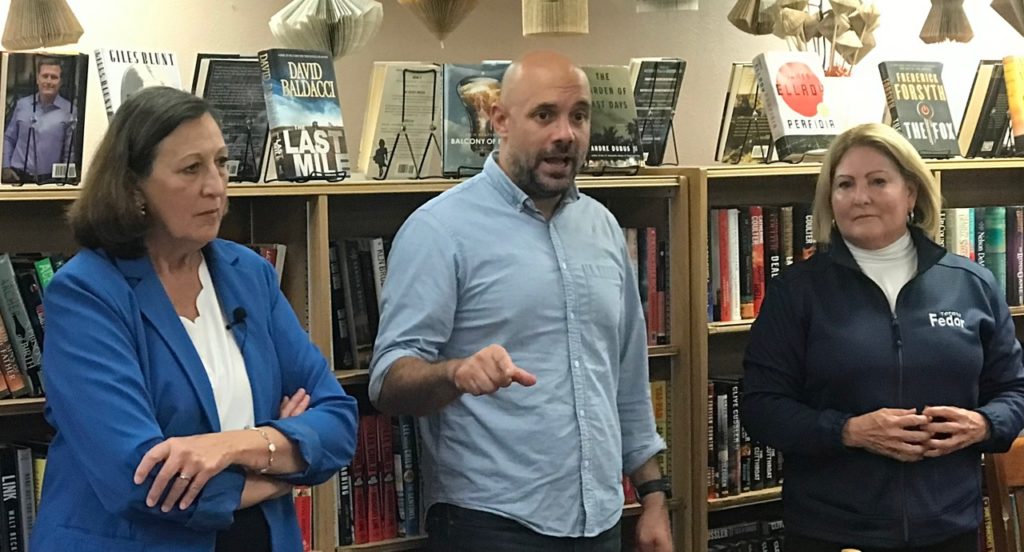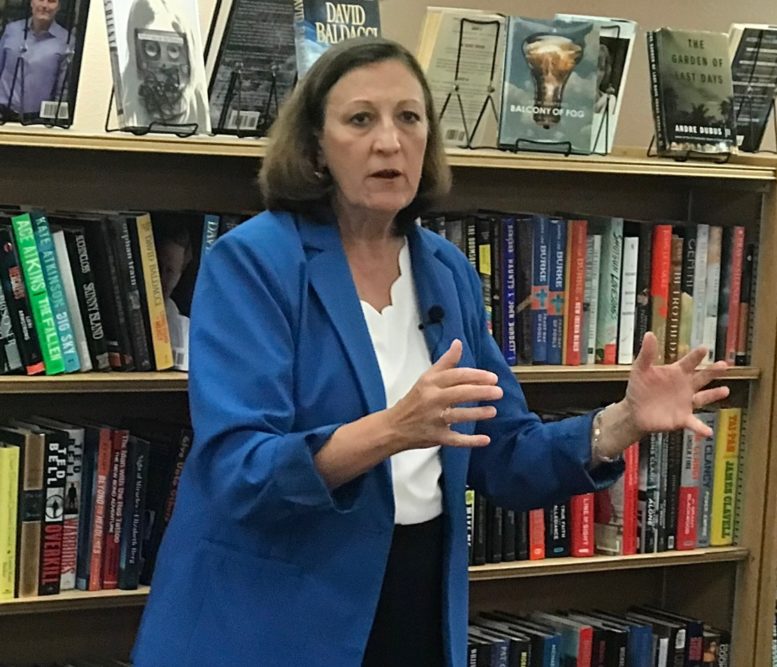By DAVID DUPONT
BG Independent News
When she’s been pressed on her judicial philosophy is, Supreme Court Justice Jennifer Brunner has responded: “To do a good job.”
The labels originalism and textualism favored by those on the right, including members of the U.S. Supreme Court“ are nothing but political labels that never should be in our court system,” she said.
Brunner is running to become the Chief Justice of the Supreme Court, having served as a justice for two years. She is running against fellow justice Sharon Kennedy.
Brunner brought her Ohio Justice Tour to Bowling Green for a stop at Grounds for Thought. She was joined by Jeff Crossman who is running for Attorney General, and Teresa Fedor, who is running for Ohio School Board.
The tour has visited 40 counties in about a week. She hopes to visit 20 or so more counties before Election Day on Nov. 8.
Originalist judges look at the Constitution and if they don’t see a right explicitly mention, say it is a matter for the states to decide.
While the justices running for reelection on the Republican tickets tout “predictability,” their approach to the law is anything but, Brunner said.
“Not having uniformly created-by-the-courts rights across the country based on substantive due process” is disruptive, Brunner said “This is becoming very unpredictable, and that predictability is supposed to be what the rule of law guarantees to all of us – safety, predictability — that have served us really, really well as a springboard for the pursuit of happiness that goes back to our Declaration of Independence.”
Brunner, who has served as a trial court and appeals court judge, as well as Secretary of State, said the law follows as society changes and evolves with it.
“If we overturn a case it has to be for a very, very good reason,” Brunner said. “It should be because somehow over time that law is hurting people. We are public servants who happen to be judges.”

Crossman, a member of the Ohio House who is running for Attorney General, said that if the concept of “substantive rights,” those not explicitly spelled out in the Constitution, is rejected, a whole host of rights goes out the window, such as freedom to travel.
The U.S. Supreme Court seems poised to rule that state legislatures have complete control over drawing legislative and congressional districts as well as determining election laws. Such a ruling would cut the courts out and cuts out the power of the governor to veto bills.
The issue is that Ohioans, in statewide races, typically vote 52 percent Republican and 48 percent Democratic, yet the state legislature has a super majority of 70 percent in favor of the Republicans, Crossman said.
This has led to “extreme” legislation such as the ban on abortion after about six weeks and purges of voter rolls.
That lack of accountability, he said, has led to scandals, most recently the bribery scandal involving former House Speaker Larry Householder and House Bill 6, a bail out for First Energy.
When Householder was indicted, Crossman led an effort to expel him. That was delayed, and Householder was re-elected. It took another six months, Crossman said, for him and others to succeed in ousting Householder, making him the first legislator to be expelled since the Civil War.
Householder is still awaiting trial, and ratepayers, he said, are still paying $8 million a month because of HB6.
“Ohio deserves accountability,” Crossman said. But having non-competitive districts means legislators don’t have to worry about being held accountable by voters.
Brunner said gerrymandering is what prompted her to run for the Supreme Court in 2020. Not because, she said, because she wanted maps drawn a specific way, but because she wants fair maps.
When she was Secretary of State, her office sponsored a national contest to see if fair maps cold be drawn, and it showed they could be.
That led to putting a constitutional amendments calling for fair maps. Those passed by 70 percent of the vote.
Efforts to redraw the maps have been stymied with the Ohio Supreme Court ruling against them multiple times, all by a 4-3 margin.
The three justices who voted in the minority to uphold the partisan maps, Kennedy, Pat DeWine, and Pat Fischer, are all running for re-election.
Maureen O’Connor, the current Chief Justice, sided with the Democratic justices. She cannot run for re-election because of age restrictions on judges. Brunner said it was O’Connor who encouraged her to run.
Teresa Fedor, a state senator running for state school board, was also on hand.
As she did in another recent visit to BG she spoke of the need to recruit more teachers to address the shortage and reduce testing.
Those tests just put millions of dollars in the pockets of testing companies and don’t benefit students.
The state must also address the teacher shortage.
“We need to give teachers the tools to teach, our students the tools to learn, and the parents the certainty that we’re not going to have these culture wars in our classrooms.”
Intel will build a microchip plant outside of Columbus, she said. That’s good news. “I don’t want to see Intel recruiting people from outside Ohio to hire.”
[RELATED: Teresa Fedor eyes public school funding in race for state school board]
Brunner also criticized candidates who refused to participate in public forums such as those sponsored by the League of Women Voters.
Voters formulate their opinions during such events.
The future of Ohio is at stake in this election, Crossman said. “If you want accountability, transparency, fiscal responsibility, then you have to vote Democratic otherwise these folks will continue down the road in which they’re headed. They don’t want any accountability to the people of the state.”


